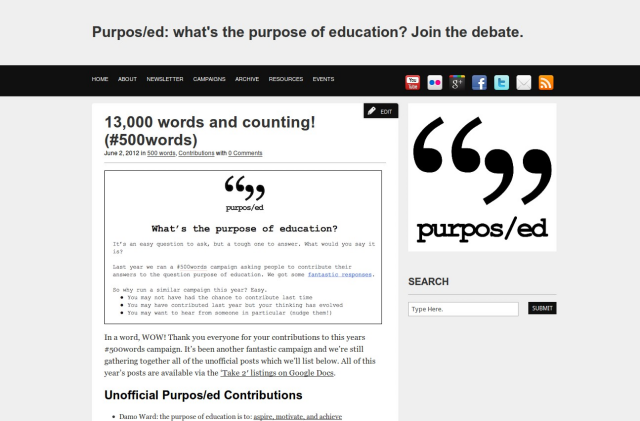Why would I send my child to secondary school?
You don’t have to believe in the lazy education is broken meme to think that there’s something wrong with the way we educate young people. As someone who worked for seven years as a teacher and senior leader in schools I’m not just some guy who has a view on education: I’ve seen what it looks and feels like behind the scenes in both ‘outstanding” and ‘failing’ schools.
I want to make it clear that nothing I’m about to say has anything to do with the role, status or professionalism of teachers. As I’ve said many a time, most teachers I’ve ever come across do a fantastic job and are dedicated and hard-working. My target here is, specifically, the English education ‘system’ (if we can even call it that).
It’s also important to bear in mind that I’m not talking about my own choices as a parent here, but rather me qua parent. The question I’m asking isn’t “should I homeschool my child?” but rather, “how should we as a society educate young people?” It’s a symptom of our age that the former is always assumed whenever I bring it up. Individualism and the logic of the market seems to pervade everything these days.
I’m also going to be setting aside the purpose of education for the moment. Going into any depth here would make this into either an inordinately long post, or a series of posts. That’s not my aim and, in any case, I spent a couple of years exploring that question with Purpos/ed.
Secondary school is a huge waste of time. I mean that literally.
Let’s do the maths.
Many secondary schools I’ve taught in divide the day into six 50-minute lessons. Children go to school five days per week so that’s 5 x 6 x 50 = 1500 minutes (or 25 hours) in lessons. However, in terms of learning time, once we’ve factored in changeovers, settling, the costs of task-switching and routine tasks/admin, that’s probably down to 5 x 6 x 30 = 900 minutes (or 15 hours).
The way that people get better at things is through formative feedback. In other words, someone gives you timely advice on a thing you’ve just done and shows you how to improve it. That could be how to write persuasively or how to swing a tennis racquet. In a class of 30+ children formative feedback happens less often that we’d all like.
So, going back to the calculations, the learning that takes place in 15 hours per week with a 1:30 ratio could probably take place a lot more quickly and accurately with a 1:1 or 1:5 ratio. I’m well aware that the research on class sizes shows that numbers have to be cut dramatically to make a difference but with these kinds of ratios Vygotsky’s Zone of Proximal Development starts kicking in on a regular basis. My son’s footballing skills came on a lot more during 16 hours in a small group during half-term than they would have done in 16 one-hour lessons within a large group over four months.
We can, and I believe should, organise learning differently. We could have smaller learning groups for 20 weeks per year and the other 20 weeks could be the equivalent of apprenticeships – putting those knowledge, skills, attitudes and behaviours into action. Or each week could be divided into two. Or they could do one week on, one week off. There’s many permutations.
I know I’m likely to get some pushback in the form of how important a role schools play in terms of socialisation. I get that. But I think it’s important to realise that, as parents, we seem to have outsourced learning and socialisation and conflated it with reliable babysitting to allow us to go to work. We’re missing the point by tinkering around the edges.
Having worked in schools with extremely poor pupil behaviour, I realise that this, too, is likely to be another objection. But then, behaviour is the responsibility of those who construct the environment as well as the actions of the individual. If we organised learning differently, in re-imagined spaces, then we’d probably get different kinds of behaviours.
In short, instead of asking what we need to do with schools to perpetuate what we’ve already got, perhaps we should be thinking about the society we want to create for our children when they grow up. All I’m asking for is a rethink. There’s no point in adding epicycles. Iteration is all well and good but, to begin with, you have to be heading in the right direction.
If you haven’t already read Will Richardson’s book Why School? I’d recommend it as a short read that fleshes out some of the points I’ve made above. Also, Sir Ken Robinson’s RSA Animate on Changing Education Paradigms is a must-see on just how crazy the system has become. Once that’s whetted your appetite, then dive into Prof. Keri Facer’s marvellous Learning Futures. 🙂
Image CC BY-NC-SA donnamarijne



